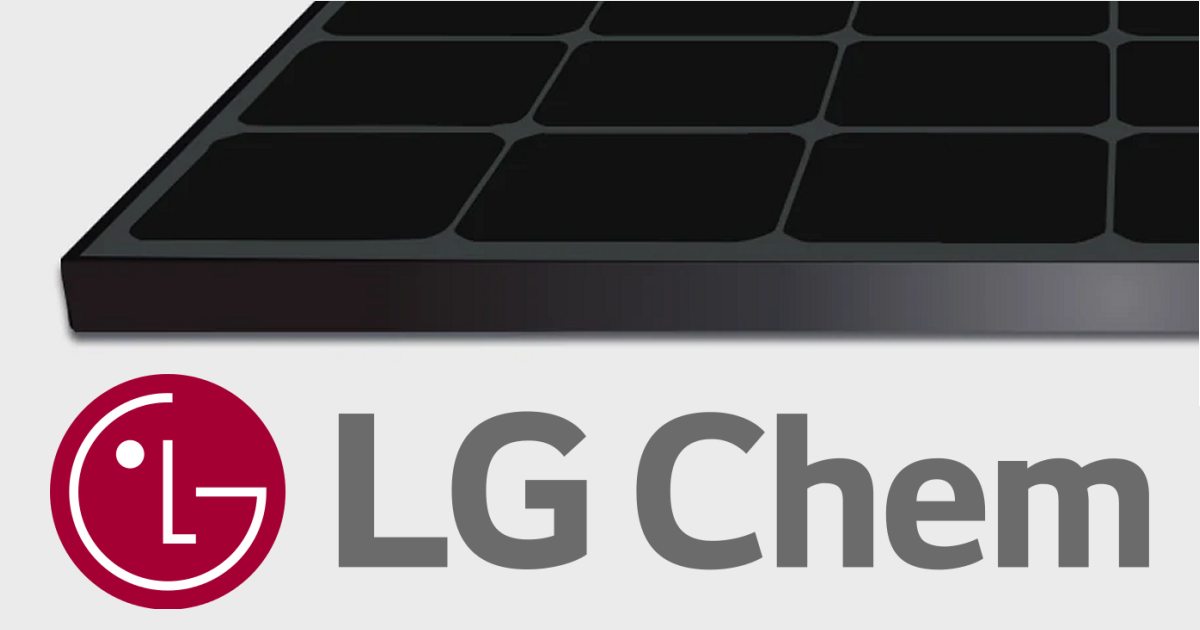
South Korea’s LG Chem has announced it has developed a plastic material that can replace the aluminium frames used in solar panels.
Solar panel frames don’t tend to generate a lot of excitement, but they play an important role: providing a panel strength, protection and fixing points. Frames need to be strong, lightweight and able to endure the elements for decades. To this point, aluminium has been the most widely used material.
LG Chem’s new material has been named “LUPOY EU5201”. It’s a composite thermoplastic made up of Acrylonitrile Styrene Acrylate (ASA) and polycarbonate (PC), both of which are petrochemical (oil) based.
The firm says the plastic solar panel frame material has aluminium’s durability, is half the weight, has flame retardant attributes, low thermal expansion and is price-competitive with aluminium.
Note: the image above doesn’t reflect how the plastic solar panel frames may look as LG didn’t supply imagery.
While an aluminium frame only makes up around 10% of a solar panel’s weight – around 2kg – any weight reduction will probably be welcomed by installers who have to tussle with solar panels on rooftops all day – not the safest of tasks given the generally unwieldy nature of PV modules.
There wasn’t any mention in the announcement of LUPOY EU5201 frames to be used in the production of LG solar panels, which are manufactured by another LG Corp company. If LG Chem’s material is so good, then its sister company should probably start using the plastic solar panel frames to prove their mettle to the wider market.
Plastic Solar Panel Frame Recycling
One of the many benefits of aluminium is it can be recycled and doesn’t lose any quality during that process – it can be recycled pretty much forever. Scrap extruded aluminium also fetches decent prices; from $1 – $2 a kg in Australia currently.
With regard to end-of-life issues for panels that will use the new LUPOY EU5201 based plastic frames, LG Chem says:
“The Company also plans to review ways to collect the solar panel frame that will be discarded in the future and reproduce them into PCR PC.”
(PCR PC = Post-Consumer Recycled polycarbonate)
That reads like a (non-aluminium) can being kicked down the road, which is what we’ve done with solar panel recycling generally until fairly recently.
The oil origins aside, the good news is it is possible to recycle ASA/PC material blends – although this study indicates compared to virgin PC/ASA, a loss in impact strength occurs. But it notes:
“Quality improvement in compounding or blending with virgin PC/ASA may be used to compensate these quality losses and establish a closed-loop recycling system.”
LG Chem says it has Post-Consumer Recycled polycarbonate development technology, so it will be able to produce PCR raw materials at the request of customers.
LG Chem is Korea’s largest chemical company, developing various petrochemical products and advanced materials for energy storage and other applications. LG Chem also produced LG solar batteries, but spun that business off into a new entity named LG Energy Solution last year.
In 2019, LG Chem became the first Korean petrochemical company to announce it would achieve carbon neutrality by 2050.

 RSS - Posts
RSS - Posts



As a consumer, if given the option i would pick Aluminium over plastic.
As this blog states aluminium is endlessly recyclable, and are we not trying to reduce the use of plastics in our community?
“The firm says the plastic solar panel frame material has aluminium’s durability…”
I suspect not. Per Wikipedia link re polycarbonate (PC):
How ASA blended with PC will eliminate (or greatly reduce) hydrolyzing PC to BPA at elevated temperatures is not clear to me.
In a summer heatwave solar panel temperatures can get as hot as 149 °F (65 °C).
https://avasolar.com/how-hot-do-solar-panels-get/
https://climate.nasa.gov/effects/
So I’d be very concerned that these ASA-PC framed solar panels could potentially leak significant levels of BPA into rainwater collection storage tanks for drinking water purposes, and/or into stormwater runoff into creeks and streams that could interfere with aquatic wildlife.
I’d suggest the precautionary principle is: When in doubt, stick to aluminium frames.
I’d like to see the data that shows ASA-PC-framed solar-PV panels have similar strength compared with aluminium-framed equivalents at the higher end of the range of ambient temperatures.